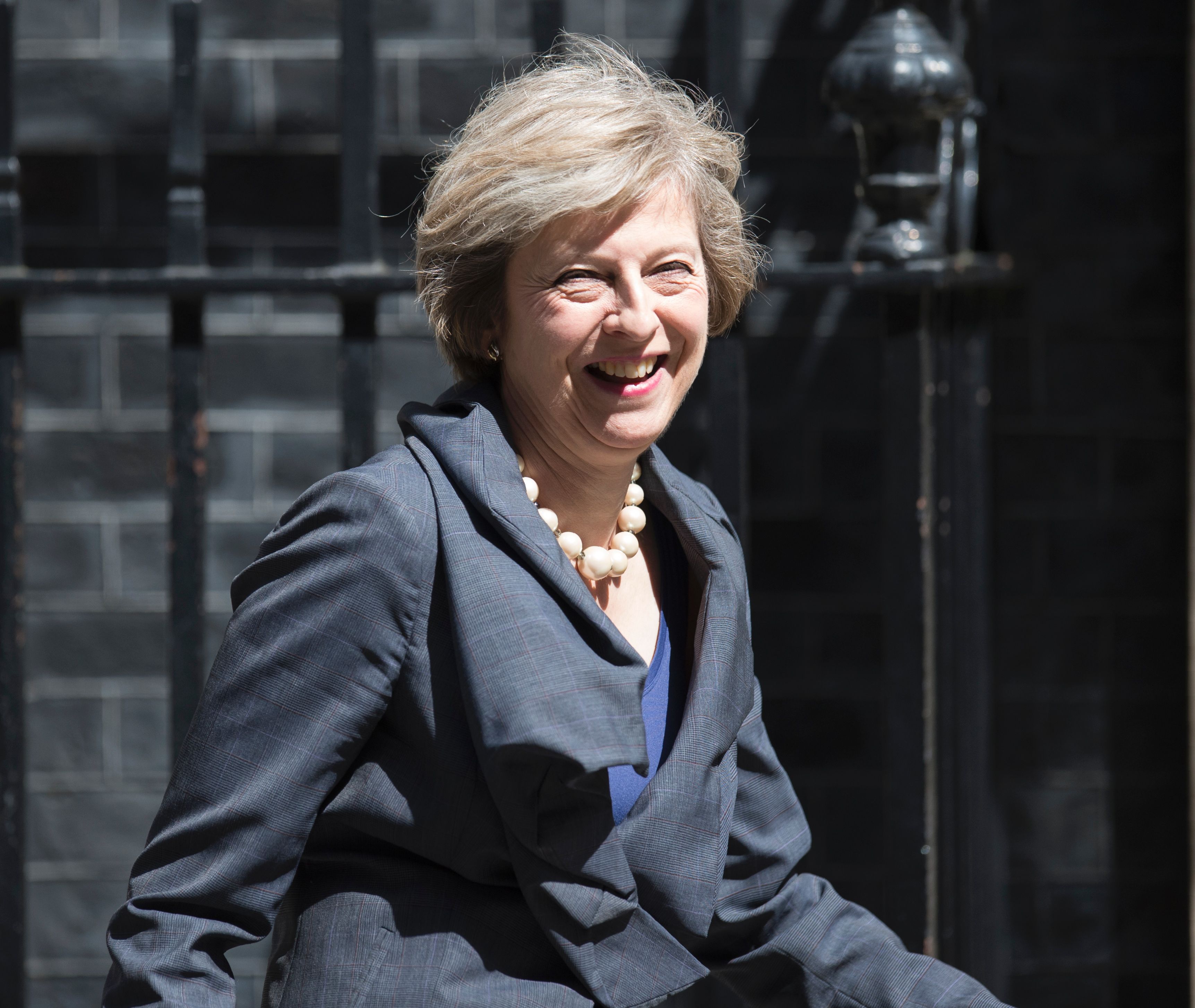![Teresa May Begins Job of UK Prime Minister [video : 87035888]](http://videos.usatoday.net/Brightcove2/29906170001/2016/07/29906170001_5034069134001_5034043394001-vs.jpg?pubId=29906170001)
LONDON — Theresa May became the British prime minister Wednesday after David Cameron formally stepped down, becoming the second woman to hold that post. Margaret Thatcher was the first, more than a quarter-century ago.
May immediately faces some formidable tasks in leading the United Kingdom after it voted to leave the European Union in a June 23 referendum. Here are five challenges May must tackle:
Announcing a Cabinet
May quickly started assembling her new government with several appointments, including the surprise announcement that Boris Johnson, the flamboyant former London mayor, will be foreign secretary — one of the most high-profile positions in the British government. Johnson, who led Britain's leave camp in the contentious referendum, was considered the leading choice to replace Cameron but quickly dropped out of the running.
Johnson replaces Philip Hammond, who was named treasury minister, called chancellor of the exchequer.
May filled her former job of Home secretary with Amber Rudd, Britain’s former Energy secretary. Rudd's appointment means two of the top four jobs in the government are held by women.
Michael Fallon will continue as secretary of State for Defense. Liam Fox was appointed the minister for international trade.
![Congratulations pour in for Britain's new PM [oembed : 87039962] [oembed : 87039962] [oembed : 87039962] [oembed : 87039962] [oembed : 87039962] [oembed : 87039962] [oembed : 87039962] [oembed : 87039962] [oembed : 87039962] [oembed : 87039962] [oembed : 87039962] [oembed : 87039962] [oembed : 87039962] [oembed : 87039962] [oembed : 87039962] [oembed : 87039962] [oembed : 87039962] [oembed : 87039962] [oembed : 87039962] [oembed : 87039962]](/Portals/_default/Skins/PrestoLegacy/CommonCss/images/smartembed.png)
![Closer look at Britain's Theresa May [gallery : 86961038]](http://www.gannett-cdn.com/-mm-/a79031a9d2c7124dbf9259dd5cbc62e3b710887c/c=513-0-2488-1688/local/-/media/2016/07/13/USATODAY/USATODAY/636040063998304880-AFP-553965109.jpg)
Leaving the European Union
May, who supported the campaign to remain in the EU, said “Brexit is Brexit” and the United Kingdom will leave the bloc with no attempt to “remain through the back door.” Top EU leaders want Britain to leave as soon as possible. May must trigger the negotiation process by invoking Article 50 of the EU treaty, thereby launching the two-year exit process. “She's said that we will trigger Article 50 around the end of this year," Chris Grayling, who managed May’s leadership campaign, told the BBC.
May on Wednesday named veteran Conservative lawmaker and Euro-skeptic David Davis to lead Britain’s exit talks with the EU, a newly created post. Davis, who has clashed with May over privacy and free-speech issues, has long advocated leaving the EU and will now be in charge of implementing the exit.
Another general election?
The opposition Labour Party and the Liberal Democrats party said May should call a snap general election — the last parliamentary vote took place in 2015, and the next is due in 2020. May has said there will be no general election before 2020 and ruled out a second referendum on the EU membership issue. A petition calling for a second referendum will be debated in Parliament in September after attracting more than 4 million signatures, but will not result in a decision.
![Cameron: Serving as prime minister ‘greatest honor of my life’ [oembed : 87029794] [oembed : 87029794] [oembed : 87029794] [oembed : 87029794] [oembed : 87029794] [oembed : 87029794] [oembed : 87029794] [oembed : 87029794] [oembed : 87029794] [oembed : 87029794] [oembed : 87029794] [oembed : 87029794] [oembed : 87029794] [oembed : 87029794] [oembed : 87029794] [oembed : 87029794] [oembed : 87029794] [oembed : 87029794] [oembed : 87029794] [oembed : 87029794] [oembed : 87029794] [oembed : 87029794] [oembed : 87029794] [oembed : 87029794] [oembed : 87029794] [oembed : 87029794] [oembed : 87029794] [oembed : 87029794] [oembed : 87029794] [oembed : 87029794] [oembed : 87029794] [oembed : 87029794] [oembed : 87029794] [oembed : 87029794]](/Portals/_default/Skins/PrestoLegacy/CommonCss/images/smartembed.png)
Safeguarding the economy
The vote to leave the EU roiled global stock markets and sent the pound to a 31-year low in the immediate aftermath. May promised to “get tough on irresponsible behavior in big business.” In a speech shortly before becoming the Conservative Party leader, she said, "There are business leaders whose response has not been to play for Britain’s departure from the EU or to think of the opportunities withdrawal presents, but to complain about the result and criticize the electorate.” Finance Minister George Osborne attempted to calm markets and visited Wall Street banks Monday, telling MSNBC’s Morning Joe, “We’re out there selling Britain to the world.” He will also travel to China and Singapore on that mission in the coming weeks.
![U.K.'s next prime minister, Theresa May, formidable like 'Iron Lady' Thatcher [oembed : 87029808] [oembed : 87029808] [oembed : 87029808] [oembed : 87029808] [oembed : 87029808] [oembed : 87029808] [oembed : 87029808] [oembed : 87029808] [oembed : 87029808] [oembed : 87029808] [oembed : 87029808] [oembed : 87029808] [oembed : 87029808] [oembed : 87029808] [oembed : 87029808] [oembed : 87029808] [oembed : 87029808] [oembed : 87029808] [oembed : 87029808] [oembed : 87029808] [oembed : 87029808] [oembed : 87029808] [oembed : 87029808] [oembed : 87029808] [oembed : 87029808] [oembed : 87029808] [oembed : 87029808] [oembed : 87029808] [oembed : 87029808] [oembed : 87029808] [oembed : 87029808] [oembed : 87029808] [oembed : 87029808] [oembed : 87029808]](/Portals/_default/Skins/PrestoLegacy/CommonCss/images/smartembed.png)
Reunifying the country
The Brexit vote — 52% voted leave and 48% remain — divided the country as England and Wales voted to leave and Scotland and Northern Ireland voted to remain in the EU. The Conservative Party was also sharply divided, with some members campaigning to leave the bloc and others campaigning to remain. May supported remaining with the EU, but she kept a low profile during the campaigning. She has presented herself as a unifying figure, with a vision “of a country that works not for a privileged few but for every one of us.” However, unifying the country may prove difficult. Scottish leader Nicola Sturgeon said Wednesday, “Brexit means Brexit” does not apply to Scotland. “I too have a mandate, and that mandate is to respect the wishes of the people in Scotland and now to find a way to keep Scotland in the European Union,” she said.
![United Kingdom Overview [oembed : 87046966] [oembed : 87046966] [oembed : 87046966] [oembed : 87046966] [oembed : 87046966] [oembed : 87046966] [oembed : 87046966] [oembed : 87046966] [oembed : 87046966] [oembed : 87046966] [oembed : 87046966] [oembed : 87046966]](/Portals/_default/Skins/PrestoLegacy/CommonCss/images/smartembed.png)


![AFP 553934312 I PTS GBR [image : 87027610]](http://www.gannett-cdn.com/media/2016/07/13/USATODAY/USATODAY/636040053086529032-AFP-553934312-83291380.JPG)
